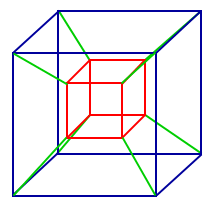If you know about complex numbers, you will be able to appreciate one of the great unsolved problems of our time. The Riemann zeta function is defined by
Zeta(z) = SUMk=1 to infinity (1/kz) .
This is the harmonic series for z=1 and Sums of Reciprocal Powers if you set z equal to other positive integers. The function can be extended to the entire complex plane (with some poles) by a process called “analytic continuation”, although what that is won’t concern us here.
It is of great interest to find the zeroes of this function. The function is trivially zero at the negative even integers, but where are all the other zeroes? To date, the only other zeroes known all lie on the line in the complex plane with real part equal to 1/2. This has been checked for several hundred million zeroes!
No one knows, however, if all of the infinite number of non-trivial zeroes lie on this line; the conjecture that they do is called the Riemann hypothesis and is one of the great unsolved problems of mathematics, dating back to 1859.
Presentation Suggestions:
Even though students may not understand all the technical details of this Fun Fact, they usually find it fascinating that a great unsolved problem amounts to finding all the zeroes of some function (a concept they are familiar with) and that it turns out to be related to other things that they may have heard about.
The Math Behind the Fact:
Many other problems in number theory, such as ones involving the distribution of primes, have been shown to be related to the Riemann hypothesis, so answering this would provide insight to a whole bunch of other problems! For instance, the Prime Number Theorem gives a good approximation to how many primes are less than a given number, but the Riemann hypothesis is related to a conjecture about how good that approximation is! To see why prime numbers relate to zeta functions, see Euler’s Identity. Another connection that mathematicians are currently exploring is why the spacings of zeroes of the Riemann zeta function resemble the spacings of eigenvalues of random unitary matrices.
How to Cite this Page:
Su, Francis E., et al. “Riemann Hypothesis.” Math Fun Facts. <http://www.math.hmc.edu/funfacts>.
References:
any book on analytic number theory
Fun Fact suggested by:
Francis Su

